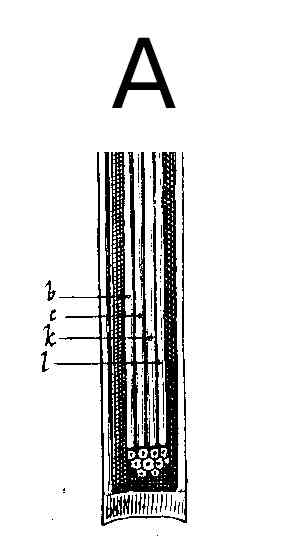How Do External Objects Affect the Sense-organs?
Table of Contents
13. How do external objects affect the sense-organs and incite them to move?
There are fine filaments which:
- come from the innermost recesses of the brain
- make up the marrow of the nerves.
These are present in all its parts serving each sense organ.
These filaments can be most easily moved by the objects of these senses.
When they are slightly moved, they immediately:
- draw the parts of the brain where they come from
- open the passages of certain pores on the inner surface of the brain.
Hence, the animal spirits:
- immediately begin their course
- are carried through the same passages into the nerves and muscles
They initiate movements that are exactly similar to what we feel when our senses are similarly affected.
Fire moves extremely fast. It has the power to move part of the skin that it touches.
If fire A is brought closer to foot B, the fire will move the skin in that foot, pulling the cord C.

C will then open the passage of pore D E where this cord terminates at the same moment.
Just as if you pull one end of a rope, the bell to which the other end is attached rings at the same moment.
Thus by opening pore D, the animal spirits flow into the concavity F and are carried through it:
- partly into the muscles which retract the foot from the fire
- partly into the muscles that turn the eyes and head to look in that direction
- the rest of the body for its own defense.
But the animal spirits thus excited through this passage D E can also be carried to these muscles and to many others.
How do the animal spirits follow their course through the brain’s pores? How are these pores arranged?
There is an innumerable number of fine filaments like A which:
- all originate from the inner surface of the brain
- are distributed throughout the body to serve the organs of touch.

In most cases, they are not directly touched by external objects, but only through the membranes that surround them.
These membranes are not the organs of the senses, just as the gloves on the hands are not the organs of the senses.
Even if these filaments are extremely thin, they stretch from the brain to other, more distant members of the body.
- Even though these members may be bent in countless ways, these filaments are not hindered.
- They do not break nor stop their action through any kind of pressure.
This is beecause they are contained within the same tubes that carry the animal spirits to the muscles.
These tubes are always slightly inflating. They:
- prevent the filaments from being excessively compressed there
- allow them to extend from the brain to the rest of the body
Therefore, when God unites a rational soul with the body, He assigns the brain as its chief seat.
He lets the soul have different senses depending on the ways how the nerves open the pores in the inner surface of the brain
Tickling
For example, the fine filaments composing the marrow of these nerves might be pulled so hard that they are broken and detached from the member to which they were attached. This would corrupt the structure of the whole body.
The soul has an interest to keep its seat intact. So it will conceive from the movement caused by that force in the brain the reason to feel pain.
If, however, those filaments are pulled with the same force but not broken or detached, the movement in the brain will provide testimony of the good condition of the other members. It will give the soul a reason to feel physical pleasure which we call tickling.
This is very close to pain in terms of its cause, but produces a completely opposite effect.
If several such filaments are pulled simultaneously and evenly, the soul will sense that the surface of the body part where they end is smooth and polished.
But if they are pulled unevenly and perceived, they will signify a rough surface.
If the filaments are not all pulled together, but one after another in a certain order, as always happens from the heat imparted by the heart to other members, the soul will perceive no sensation at all. It will not be affected more than it normally would be by its customary actions.
Moreover, if this movement caused by an external source is either slightly intensified or diminished, the increase in heat will produce a sensation of warmth in the soul, while the decrease will produce a sensation of cold.
Depending on the various ways in which the nerve filaments are affected, the soul will sense any qualities related to touch, such as moisture, dryness, hardness, heaviness, and the like.
However, these are extremely fine and can easily be moved. But they are not so minute as to be able to convey to the brain even the smallest motions of every kind of terrestrial particle.
Some particles of this kind are sufficiently coarse. Nevertheless, they affect these filaments so gently that they either press them or immediately sever them, yet their action does not reach the brain.
Just as certain drugs have the power to induce numbness, even to corrupt the actions of our members to which they are applied, and therefore to intercept all sensation.